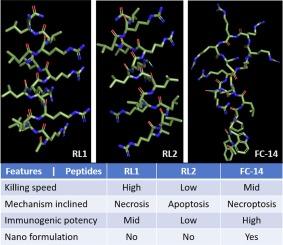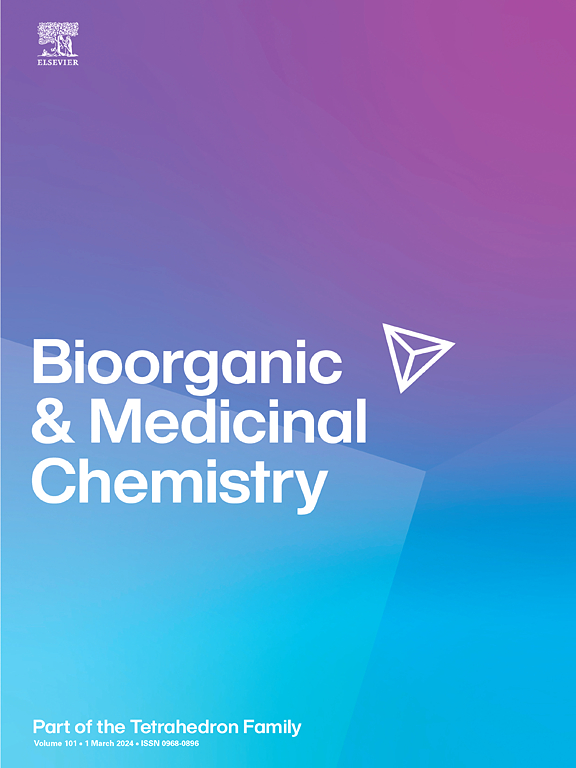Exploring structure-directed immunogenic cytotoxicity of arginine-rich peptides for cytolysis-induced immunotherapy of cancer
IF 3.3
3区 医学
Q2 BIOCHEMISTRY & MOLECULAR BIOLOGY
引用次数: 0
Abstract
The same cells can die with varied immunological consequences. For the purpose of cancer therapy, stronger immunogenic death of cancer cells is considered favorable. Membrane disruptive peptides are cytotoxic agents with tunable structures capable of not just killing heterogeneous cancer cells, but also inducing immunogenic death. However, the chemo-structural principles that underlie their immunogenic cytotoxicity remain elusive. Here we investigated a series of arginine-rich amphipathic peptides with representative structures on the relationship between the mode of cell death and the immunogenic potency. Among several hydrophobic motif-appended cyclic octaarginine peptides, FC-14 was found to induce cell stress and necroptotic death, unlike apoptotic peptide RL2 and membrane-dissolving peptide RL1. Their differing abilities to release immunogenic death markers correlated well with their potential to activate innate immunity and protective vaccinal effect in a prophylactic model, with FC-14 being the most potent. FC-14 can be pre-opsonized with albumin into nanoparticles (PopAN-FC-14) using PopAN technology to improve its pharmacokinetic properties for intravenous injection. In a syngeneic mouse model of subcutaneous breast cancer, PopAN-FC-14 showed superior therapeutic effect and safety profile than the albumin formulated nanomedicine Nab-paclitaxel (Nab-PTX). Boost injections of PopAN-FC-14 significantly enhanced tumor-specific cellular and humoral immunities, acting similarly as in-situ cancer vaccine. Overall, this work demonstrates a novel focus on the immunogenic cytotoxicity of peptides and a practical approach for effective systemic therapy of cancer.

探索富含精氨酸肽的结构定向免疫细胞毒性,用于细胞溶解诱导的癌症免疫疗法。
同样的细胞死亡会产生不同的免疫后果。就癌症治疗而言,加强癌细胞的免疫原性死亡被认为是有利的。膜破坏肽是一种具有可调结构的细胞毒剂,不仅能杀死异质性癌细胞,还能诱导免疫原性死亡。然而,其免疫原性细胞毒性的化学结构原理仍然难以捉摸。在这里,我们研究了一系列具有代表性结构的富含精氨酸的两性肽,探讨了细胞死亡方式与免疫原性之间的关系。研究发现,在几种疏水基团连接的环状八精氨酸肽中,FC-14 与凋亡肽 RL2 和膜溶解肽 RL1 不同,能诱导细胞应激和坏死。它们释放免疫原性死亡标志物的能力不同,这与它们在预防性模型中激活先天性免疫和保护性疫苗效应的潜力密切相关,其中 FC-14 的作用最强。利用 PopAN 技术,FC-14 可与白蛋白一起被预先添加到纳米颗粒(PopAN-FC-14)中,以改善其静脉注射的药代动力学特性。在小鼠皮下乳腺癌合成模型中,PopAN-FC-14 的治疗效果和安全性均优于白蛋白配制的纳米药物 Nab-紫杉醇(Nab-PTX)。注射PopAN-FC-14能显著增强肿瘤特异性细胞免疫和体液免疫,与原位癌疫苗的作用类似。总之,这项工作展示了对多肽免疫细胞毒性的新关注,以及有效全身治疗癌症的实用方法。
本文章由计算机程序翻译,如有差异,请以英文原文为准。
求助全文
约1分钟内获得全文
求助全文
来源期刊

Bioorganic & Medicinal Chemistry
医学-生化与分子生物学
CiteScore
6.80
自引率
2.90%
发文量
413
审稿时长
17 days
期刊介绍:
Bioorganic & Medicinal Chemistry provides an international forum for the publication of full original research papers and critical reviews on molecular interactions in key biological targets such as receptors, channels, enzymes, nucleotides, lipids and saccharides.
The aim of the journal is to promote a better understanding at the molecular level of life processes, and living organisms, as well as the interaction of these with chemical agents. A special feature will be that colour illustrations will be reproduced at no charge to the author, provided that the Editor agrees that colour is essential to the information content of the illustration in question.
文献相关原料
公司名称
产品信息
上海源叶
Human serum albumin (HSA)
|
99%
 求助内容:
求助内容: 应助结果提醒方式:
应助结果提醒方式:


